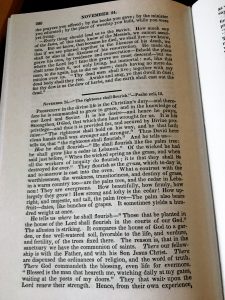Luke 2:41-52
Only Luke provides us any information about the boyhood of Jesus, and all of it is found in this section. Speculation about the reasons for this are useless and distracting. They lead us to go beyond what has been written in the Word. Instead, we need to think about what these words reveal about our Lord and Savior. The Bible is God’s message about his one and only Son (Luke 24:44; etc.) We mislead ourselves and others if we pursue speculative knowledge, which includes speculation about the “timeline of prophecy”. Don’t do it! Break the bad habit of taking pride in what you suppose the Spirit ought to have written rather than what is written. Neither do we need to speculate about why Luke included this event. Let’s content ourselves with reading and meditating on what has been written. So then, what should we learn?
Jesus was raised by believing, godly parents (2:41). The law covenant required all Israelite men to attend Passover, Pentecost, and Booths (cf. Exodus 23:14-17; Deuteronomy 16:16). Israelite women did not have this burden put on them. It was a burden, because it required a long trip, usually on foot, from the towns of Israel. A man would have to leave his job and home during the festivals and the journeys to and from Jerusalem. This required faith in the Lord to protect his possessions and to provide for the journeys and the expenses involved in attending the festivals. We also see Mary at the festival. She was about twenty-eight at this point and already the mother of several of her other (at least) six children. This would involve a lot of work for Mary and Joseph to worship the Lord.
Jesus was growing in many ways (2:43, 51-52). At twelve years old, a boy could stay with the women and children or go with the men. Jesus chose the second option. He was in Jerusalem, the city of the Great King, and there was much for him to see with his human eyes. Since he knew he was God’s Anointed, he would want to see his city. Boys have a “joy of life” excitement in exploration. We do not know if his parents gave him any guidelines about reporting back to them. Again, it is easy to speculate according to how we want this event to look to prove some point we want to make. At the end of this section, Luke emphasizes Jesus’ obedience to his parents. He also mentions Jesus growth in knowledge. Beyond those boundaries we should not go.
Jesus went to the best place for him to be, to his Father’s house (2:43-47). There he interacted with trained Bible teachers. He listened to them and asked them questions. Since he was a boy, it was not fitting for him to teach, but when asked he gave insightful answers. Certainly, this shows his humility, for the One who is God’s wisdom knew far more than any of them. It also sheds light on his later interactions with such men. He had listened to what they taught. He had the opportunity to reason out how their views compared with the truth of what he was. But the key point is that he wanted to be where God was worshiped and to participate in it in every facet. Jesus was acknowledged as an exceptional youth.
Jesus conversed wisely with his parents (2:48-50). He listened humbly while his mother gave a typical motherly rebuke. He had done nothing wrong, and he kept his mouth from any discourteous replies. But he gave them a revelation that he knew who he was, and he expected that they ought to have thought about him, according to what the Father had already made known to them. He was the Son of the Most High, the Son of God (1:32, 35 NIV). They ought to have known that he would be at his Father’s house, the temple. This sets a pattern that we see in Jesus. He was not on a quest for self-knowledge. He is knowledge and wisdom, and he expects people to recognize his greatness. Do we? Do we function according to the truth of who and what Jesus is?
Grace and peace, David

 Genesis 40:1-23
Genesis 40:1-23 Proverbs 23:12
Proverbs 23:12